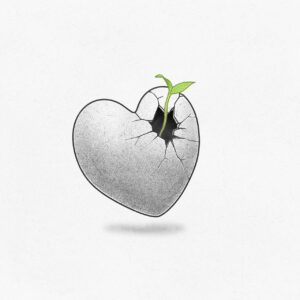Have trust issues and endeavor to regain trust in a social context where fear is clearly promoted as an identity flag of some country and, where hate-speech is the language?
Trusting can only be faced as an act of courage.
You might even hear that the world is full of good people and that evil people are not the majority: is basically true that inside man inhabits the good and the evil. As true as seasons happen throughout the year.
The same is to say that anything is possible: it all depends on each one choice.
How a person perceives the world depends mainly on how tolled or available his mind is. And both spirituality (not in a sense of religion) and the environment have something to say.
Let's agree that spirituality is far beyond religion and many people who do not practice any religion, though they value the existence and importance of its role on an individual perception of life.
Let’s suppose that spiritualities die (which of course isn’t, as so many people consider it relevant in their journey). If spirituality dies: the individual is nothing more and nothing less than a product of his environment combined with biological traits and family inherited behavior. Spirituality dies and along with it goes hope, faith, and belief in a better place.
A life with no hope or faith or belief is a life without trust.
Are you lacking in hope, lack of faith in a better future, lack in some sort of belief to keep you going?
Is very possible that trust issues are blocking your way.
1. Trust Issues? What Are The Common Signs?
Indeed a challenge.
To trust people when you have an accountable amount of past experiences of people taking advantage of you, lies, betrayals, deceives... You name it.
"IT'S HARD TO TRUST WHEN ALL YOU HAVE FROM THE PAST IS EVIDENCE WHY YOU SHOULDN'T"
On the other hand, how can you have fulfilling relationships, may they be friendships or intimate relationships without trust?
Life doesn’t feel real, it feels like a bad terror movie, not fulfilling: you’ll feel half joy in living. Relationships take a major role in our life well-being.
It's worth giving it a thought - we all want love in our lives, if you're dealing with trust issues and find ways to work on this subject, on what depends on you: take responsibility for your own insecurities and work on them. The solution - it's daring to say- but it starts in the self.
The most common trust issues are these:
- Avoid commitment - avoiding it in a sense that involves emotional intimacy, being seen as vulnerable, showing the inside world to the other person.
- Tendency To Think That People Want To Hurt You Intentionally - well, let us not be the naif thinking that these people don't exist. They do. But when it gets to a point that you don't know how o receive love, a compliment, or a kind gesture, because you think is not genuine: that's a trust issue.
- Isolating from others - cultivating new friendships is definitely not a priority, one you have got to the conclusion that people are not trustworthy.
- Being hypervigilant - and imagining worst-case scenarios or thinking about big catastrophes if you have the feeling that someone's tricking you.
- Mistrust that interferes with relationships – and that leads to dramatic and stormy relationships and or suspicion and or anxiety in close relationships.
- Being reluctant in opening up, as a consequence of the fear of not being accepted for who you are.
Of course, those trust issues don’t just appear, out of nowhere, and are incorporated in you as an alien entity.
They come from experiences, traumatic life events. Traumatic and not resolved.
Most people who suffer from trust issues, they have experience devastating, an impactful situation that was not overcome, that did not heal. The most common life events or traumatic situations are :
Some people have any of these events in their life path and yet show evidence of clear and in some cases, crippling trust issues.
Very likely your trust issues are due to abandonment trauma in childhood…
2. Trust And Abandonment Trauma
When we hear the expression “abandonment trauma” we often associate it with the literal abandonment of a child in the door of an orphanage a convent.
But it isn’t just that.
One of our human primal fears is the fear of abandonment. And if during childhood we are somehow exposed to abandonment, some experience some traumatic event or experience is very likely that we might struggle with this issue in adult life.
In order for a human being to develop emotionally healthy, some basic physical and emotional needs have to be met. When needs aren’t met, the outcome is feelings of abandonment.
Parents can induce feelings of emotions in their children when:
- the roles parent/children are inverted or the parent treats the child as a peer;
- parents are over-demanding
- parents who project their own expectations about themselves, onto their children, to reinforce their own egos and sense of self
- a parent who ridicules their children or suppresses children from expressing themselves.
You were certainly a child of someone and possibly a parent of some.
Be aware: of your own pains or the pain, you might be causing your children.
When you are aware, more likely you will take measures to heal those wounds. That’s more than a good reason to heal and regain trust.
3. Why Should You Heal And Regain Trust
Because unhealed wounds just keep on bleeding.
Children grow into adults.
And children who have suffered feelings of emotional abandonment most likely will “choose” relationships with the same pattern – a partner who might abandon them – to reinforce that (limiting) belief they have inside, in the subconscious mind, that they “are to be abandoned” or just be haunted by the ghost and develop personalities traits or signs of:
- envying other people's relationships
- narcissism and overcontrolling in relationships
- “people pleaser" (the one that gives too much)
- the settling for less (maintaining relationships that are not satisfying at all)
If somehow you resonated with this: you’re not doomed.
You're not doomed if you're willing to work on yourself. And heal. and regain trust.

4. How Can You Heal And Regain Trust?
4.1 Inside Job
Healing trust issues start where the issues are: in you.
Exactly: an inside job.
Therapist coach Matt Phifer, who specialized in the recovery of people exposed to narcissist relationships almost as an addiction, mentioned in a podcast run by Richard Grannon that when someone says show a high level of mistrust in others, the message underneath his inner emotion is fear that “ I don’t trust myself to deal with a situation if it turns out to be difficult”.
So the healing process of trust issues starts within you.
4.1.1 Inside Job: Be Trustworthy To You
Start on being a person trustworthy to you. How?
If you say you’re going to do something: do it. Do whatever you can to keep your word. Make your word have meaning. That’s how you signal your own brain that you are worthy of trust.
Think again when you say “Yes” or “No” to something. if you say “Yes” make sure you really want that and do all you can to keep your word.
If you don’t want to do something, say no. Don’t say “yes” just to keep others' expectations fulfilled. That also is a clear sign of coherence in your brain: you feel more self-confident. That’s how you start building self-trust. And inspire trust in others too.
That will make your task a lot easier. It will make wonders in your self-esteem.
4.1.2 Inside Job: Practice Forgiveness
Practice forgiveness is actually an act of self-care. Guilt is such a pernicious feeling, such a heavy burden to carry it rots you inside.
You might feel guilt for your actions or even for other people’s actions - especially if you were exposed to a narcissistic abusive relationship.
Take responsibility (response + ability or ability to respond) over your feelings and actions: be able to respond.
Taking responsibility to heal. Taking responsibility for your pain doesn’t mean you’re the one who is to blame: it means you’re the one who’s going to fix it.
Forgive others because you deserve to be at peace with yourself.
If you come to a conclusion that some responsibilities are yours: apologize, mend it if you can, and, most of all: forgive yourself.
Not as an indulging act but as in recognizing that you could have done things in a better way: and take it as a lesson about yourself (why what moved you) and about the situation itself (how what happened).
Repeat as often UNTIL YOU BELIEVE IT:
4.1.3 Inside Job: Accept Risk
Accept the risk of a relationship.
Don’t ban yourself to find love in a future relationship, or to have better communication with your actual partner just because of fear it might go wrong again.
Don’t settle for less: not in a relationship with others, not in a relationship with yourself.
People change, situations change. And the best way to get to an optimal place: is to work on yourself. You'll be able to choose better, you be able to deal better with any difficult situation that comes your way.
Keep in mind that you do not have control over others, but you can control the outcome if you have control over yourself, on how you respond to the situation: that will bring you power.
Repeat to yourself:
4.1.4 Inside Job: Trust Takes Time
Trust Take time
If your mind is has fear of abandonment ingrained has a pattern, it might be confusing. You will feel “comfortable” because it “is a known situation” (in a subconscious mind). And when you realize: nightmare again.
Just because you’re willing to regain the trust doesn’t mean you going to rush blindly into trust in a relationship with a person without knowing if that person deserves your trust.
Trust takes time. It's’ built. And communication is the key. Healthy communication. When you say what you mean, without trying to hurt, and most important: you listen.
People can not accept you for you who you are and walk away? That’s not the Big Ghost of Abandonment, darling: take it as a blessing from the Universe.
"Be aware that healthy relationships are built on trust, and that trust takes time to develop. It may be unwise to share too much of yourself and about yourself too quickly."
4.2 Be Willing To Recognize When You Need Help
And when is that time?
If you have tried to help yourself, but you can seem to find a way to enjoy the simple pleasures because the trust issues remain you should consider getting professional help when and if you identify these signs frequently:
- you have feelings of loneliness and low self-esteem;
- you struggle with anxiety and/or depression;
- are willing to give up for good on having a healthy relationship;
You should get help from a psychotherapist or counselor.
Getting Better Every Day
Trustfull Hugs, Trustworthy Hugs
From Body&Soul!
References:
https://www.mattphifercoaching.com/
https://www.youtube.com/watch?v=5lTPQ034fOw
https://www.mindbodygreen.com/articles/signs-of-trust-issues
https://www.goodtherapy.org/learn-about-therapy/issues/trust-issues
https://www.goodtherapy.org/learn-about-therapy/issues/abandonment
https://bodyandsoulbizz.co.uk/the-deeper-meaning-of-trust-is-courage/

Hey! I'm Eunice Veloso and you'll find more about me on my About Page
"In nature, nothing is lost, nothing is created, everything is transformed"
Antoine Lavoisier, 1789
The Law of the Conservation of Mass
Songs mentioned in the article:
